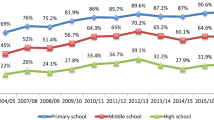Abstract
Following the Khmer Rouge takeover of Cambodia in 1975, “Year Zero” became the beginning of the destruction of the previous regime, many of its officials and teachers, and its education system. With the expulsion of the Khmer Rouge in 1979, the Ministry of Education, Youth and Sports (MoEYS) faced a massive task of rebuilding an education system with strictly limited numbers of teachers, materials, and classrooms. By the first decade of the twenty-first century, considerable progress had been made in the task of rehabilitating the essentials of the primary school system, with majority enrolments of both girls and boys, emerging improvements in retention, and the beginnings of a modern curriculum. The basis had been established for planning more sophisticated standards of learning to enable the Cambodian economy to prosper.
Access this chapter
Tax calculation will be finalised at checkout
Purchases are for personal use only
Similar content being viewed by others
Notes
- 1.
The Education Quality Improvement Project (EQIP) ran from 1999 to 2004 and included an ambitious testing programme in the three provinces where it operated. However, the standardized tests were not as comprehensive as the later assessment tests and were only applied in this one region of the country (in one grade).
- 2.
In general, groups of 8–14 common test questions (called “anchor” or “link” questions) are included on otherwise different tests that are applied in different years. Item Response Theory (IRT) tools are used to obtain statistical scores that can be compared between years. This process does depend on the quality of the common questions, which are evaluated one-by-one to insure they meet the standard of acceptable link/anchor items. All of this work is completed by EQAD using the Item and Test Analysis (IATA) software. The number of acceptable common questions varies by test subject and grade, although in some cases a relatively small number of common items are used, which can impact the validity of the comparisons over time (see Marshall et al., 2012, for a more detailed discussion of this process).
References
Cambodia Education Sector Support Project (CESSP). (2007). Results of grade three student achievement from the national assessment in 2006. Ministry of Education, Youth and Sports (MoEYS) and World Bank.
Cambodia Education Sector Support Project (CESSP). (2009). Results of grade nine student achievement from the national assessment in 2008. Ministry of Education, Youth and Sports (MoEYS) and World Bank.
Cartwright, F. (2013). Item and test analysis (IATA). Program manual. Retrieved from www.polymetrika.com
Clarke, M. (2011). Framework for building an effective student assessment system. READ/SABER Working Paper. Retrieved from https://files.eric.ed.gov/fulltext/ED553178.pdf
Education Quality Assurance Department (EQAD). (2013). Results of grade three student achievement from the national assessment in 2012. Ministry of Education, Youth and Sports (MoEYS).
Education Quality Assurance Department (EQAD). (2014). Results of grade eight student achievement from the national assessment in 2014. Ministry of Education, Youth and Sports (MoEYS).
Education Quality Assurance Department (EQAD). (2015a). Results of grade six student achievement from the national assessment in 2013. Ministry of Education, Youth and Sports (MoEYS).
Education Quality Assurance Department (EQAD). (2015b). Results of grade eight student achievement from the national assessment in 2014. Ministry of Education, Youth and Sports (MoEYS).
Education Quality Assurance Department (EQAD). (2016). Results of grade three student achievement from the national assessment in 2015. Ministry of Education, Youth and Sports (MoEYS).
Marshall, J. H., Chhun, S. Y., Put, N., Soeu, T., Ung, C., Ung, N. H., & Va, S. (2006). Student achievement and education policy: Results from the grade three survey. CESSP and World Bank.
Marshall, J. H., Chinna, U., Ngo Hok, U., Tinon, S., Veasna, M., & Nessay, P. (2012). Student achievement and education system performance in a developing country. Educational Assessment, Evaluation and Accountability, 24(2), 113–134. https://doi.org/10.1007/s11092-012-9142-x
Tandon, P. & Fukao K (2015). Educating the next generation: Improving teacher quality in Cambodia. Retrieved from https://openknowledge.worldbank.org/handle/10986/21002
Author information
Authors and Affiliations
Editor information
Editors and Affiliations
Rights and permissions
Copyright information
© 2022 The Author(s), under exclusive license to Springer Nature Singapore Pte Ltd.
About this chapter
Cite this chapter
Marshall, J.H., Ung, C. (2022). Cambodia National Assessment: A Summary of 10 Years of Student Achievement Results. In: McNamara, V., Hayden, M. (eds) Education in Cambodia. Education in the Asia-Pacific Region: Issues, Concerns and Prospects, vol 64. Springer, Singapore. https://doi.org/10.1007/978-981-16-8213-1_8
Download citation
DOI: https://doi.org/10.1007/978-981-16-8213-1_8
Published:
Publisher Name: Springer, Singapore
Print ISBN: 978-981-16-8212-4
Online ISBN: 978-981-16-8213-1
eBook Packages: EducationEducation (R0)






